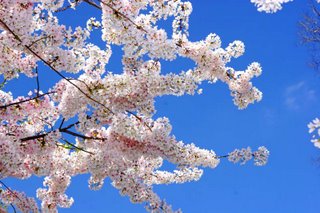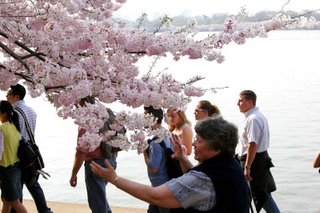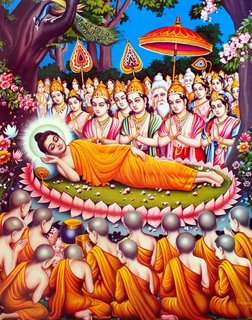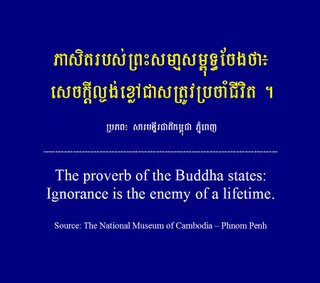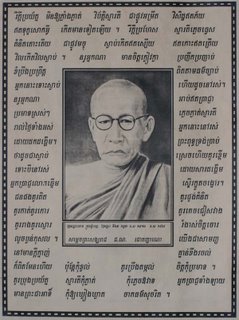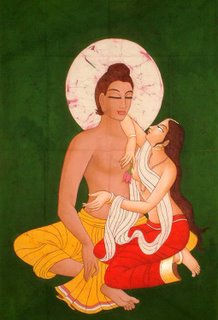
Life is a mirage, an optical illusion like a shadow that hurries.
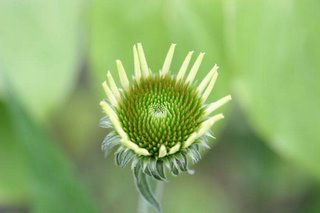
Birth is suffering for soon it meets death.

Beauty is an illusion for soon it will be decayed.

Health is separated by disease.

Beauty is separated by decay.
 Life ends in death.<
Life ends in death.<br>
The Drama of Life, Reflections Upon Truth
Posted By: Kee (pool-151-200-43-225.res.east.verizon.net) Date: Saturday, 17 December 2005, at 11:31 a.m.
Life, when we view it from a micro side, is wonderful. This is even so when one has attained wealth, status, fame, beauty, health, and all six sense faculties are satisfied. If you have a good job, good income, house, car, etcetera, and gratifying sensuality, life is nothing but wonderful. But what if you are unemployed and broke, homeless, relationship is deteriorating, children are scattered, or sensuality is not gratified, is life still wonderful?
From a macro point of view, life is nothing but an illusion. It comes and goes through stages of change that brings both pleasure and pain. If this cosmic world were to remain constant, then the rich, the beauty, the fame, the youthful, the healthy, will remain at the top. The poor, the ugly, the old, the sick, and the hungry will remain trapped in the realm of human hell. The cycle of birth and death (Samsara) gives life a chance to renew itself from round to round.
During this process of change, we will face the ultimate pain, death. And it is perhaps the hardest thing in life to say good-bye to your loved one for good. Moments before her last breath, my elder sister pulled my hand and placed it on her chest. It was hot like a flame as her heart was racing against time. Then minutes later, it no longer showed sign of movement. Her eyes began to slowly close. The blood-pumping organ completely stopped. I placed my hand on her chest again; it was as cold as ice. She was gone, for good.
I burst into tears, no longer was able to hide my own sorrow. I had cared for her for so long. I bathed her, fed her, and washed her dirty clothes every day. We had struggled together in one of the harshest regimes. The Khmer Rouges were just gone. But she couldn’t make it to the shore. Her body was lying flat on a small mat directly attached to earth underneath an open stilt house. I didn’t know what to do. But the people of Battambang were very kind and compassionate. They gave me all the help I needed.
My sister was wrapped in only a few bamboo strips, with some of her belongings, torn clothes, and the old mat she had been sleeping on. She was buried not far from the village beside a bamboo bush. While the people were gone back to the village, I still wondered around her tomb. I looked up and only saw branches oscillating in the clear blue sky, a wide empty space. That was how I felt, empty. The feeling of fear, anxiety, and uncertainty all ran into my blood. I wondered where my sister would be. I slowly walked on a sandy ox path back to the village. A new chapter in life now began.
I also recalled a story of a friend. He had a wife and a young baby son about six months old. Unfortunately, he was diagnosed with a stomach cancer. They cut 75% of the stomach to remove the cancerous part. He could not eat. A feeding tube was inserted into his throat to stay alive with only liquid food. He died at the age of 23. I still remember his words he said to his son, “Please don’t change. I love you the way you are.” He was carrying his baby as much as his strength could allow, and be with him as much as he could before he left.
I was speechless to see such a tragic death. His mother from Canada couldn’t stop crying. She grieved and sorrowfully lamented, “Why here?” She meant to say why not in Cambodia during the Khmer Rouge period while food was scarce and medical care didn’t exist. This is the way it is. This is the drama of life. Death does not discriminate and does not know if it is in the United States, in Cambodia, or anywhere else. Regardless of who you are, what you have, we all merge to one ending. This is what the Buddha called the First Noble Truth, life is suffering.
This world is such a cruel place. Health is separated by sickness. Happiness is struck down by sorrow. Beauty meets decay. And life ends in death. Nothing lasts. Even the toughest steel corrodes and vanishes. It is a world of illusion, fast moving like a shadow that hurries. It is a life drama for all living beings.
The Buddha shows five simple truths that when truly reflected upon will bring calmness and erases fears. Here are the five truths expounded by the Buddha:
1. Old age is unavoidable. One should often reflect, “I am subject to aging, have not gone beyond aging.” Thma anh min arch kich phot pi ayuk jass barn leuy.
2. Sickness is unavoidable. One should often reflect, “I am subject to illness, have not gone beyond illness.” Thma anh min arch kich phot pi jum ger rokia barn leuy.
3. Death is unavoidable. One should often reflect, “I am subject to death, have not gone beyond death.” Thma anh min arch kich phot pi sach kdey slap barn luey.
4. Separation is unavoidable. One should often reflect, “'I will grow different, separate from all that is dear and appealing to me.” Thma anh min arch kich phot pi ka baek jak ney roboss dael kloun sralanh barn leuy.
5. Kamma is the cause. One should often reflect, “I am the owner of my actions, heir to my actions, born of my actions, related through my actions, and have my actions as my arbitrator.” Thma anh trov totorl phal dael kloun barn tver jia ka thomada.
When we acknowledge these five truths, often reflect upon them, we have no fear, no sorrow, and no anxiety. We are not afraid of unwanted changes in life. We accept our responsibilities and blame no one. And we die in peace, not in the state of confusion.
-------------------------------------------------- Source: Upajjhatthana Sutta
http://www.accesstoinsight.org/canon/sutta/anguttara/an05-057.htmlPhotos – Kee.


